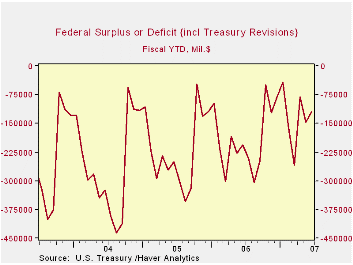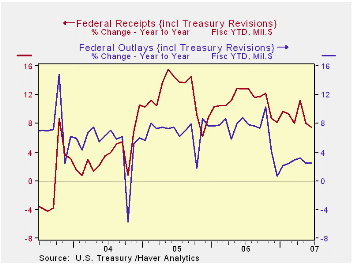 Global| Jul 13 2007
Global| Jul 13 2007U.S. Budget Reverses May Shortfall
by:Tom Moeller
|in:Economy in Brief
Summary
The U.S. federal government ran a surplus of $27.5B last month versus a deep deficit during May. Last months surplus was up from the June 2006 figure of $20.B. The monthly figure was near Consensus expectations for a surplus of $30B. [...]

 Net revenues grew 7.5% y/y during the first nine months of FY07. Individual income tax receipts (44% of total receipts) grew 11.5%. Corporate income taxes (13% of total receipts) were down sharply as were estate & gift taxes. Higher employment levels raised employment contributions by 4.2%.
Net revenues grew 7.5% y/y during the first nine months of FY07. Individual income tax receipts (44% of total receipts) grew 11.5%. Corporate income taxes (13% of total receipts) were down sharply as were estate & gift taxes. Higher employment levels raised employment contributions by 4.2%.
U.S. net outlays grew 2.5% during this fiscal year's first nine months versus last year driven by a 5.6% rise in defense spending (19% of total outlays). Medicare expenditures (12% of outlays) surged by14.7% while social security spending (21% of outlays) rose 5.7%. The government's interest expense rose by 4.6% y/y as interest rates have risen.
| US Government Finance | June | May | Y/Y | FYTD 2007 | FY 2006 | FY 2004 |
|---|---|---|---|---|---|---|
| Budget Balance | $27.5B | $-67.7B | $20.5B (6/06) |
-$247.7 | -$318.7B | -$412.7B |
| Net Revenues | $276.5B | $164.2B | 4.6% | 7.5% | 11.8% | 14.6% |
| Net Outlays | $206.6B | $231.9B | 2.1% | 2.5% | 7.4% | 7.8% |
Tom Moeller
AuthorMore in Author Profile »Prior to joining Haver Analytics in 2000, Mr. Moeller worked as the Economist at Chancellor Capital Management from 1985 to 1999. There, he developed comprehensive economic forecasts and interpreted economic data for equity and fixed income portfolio managers. Also at Chancellor, Mr. Moeller worked as an equity analyst and was responsible for researching and rating companies in the economically sensitive automobile and housing industries for investment in Chancellor’s equity portfolio. Prior to joining Chancellor, Mr. Moeller was an Economist at Citibank from 1979 to 1984. He also analyzed pricing behavior in the metals industry for the Council on Wage and Price Stability in Washington, D.C. In 1999, Mr. Moeller received the award for most accurate forecast from the Forecasters' Club of New York. From 1990 to 1992 he was President of the New York Association for Business Economists. Mr. Moeller earned an M.B.A. in Finance from Fordham University, where he graduated in 1987. He holds a Bachelor of Arts in Economics from George Washington University.






